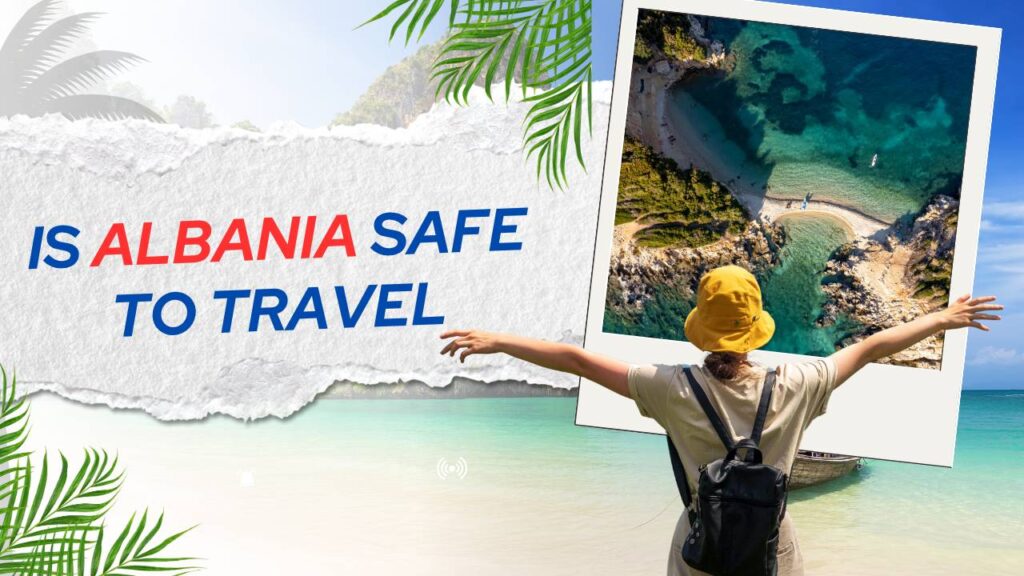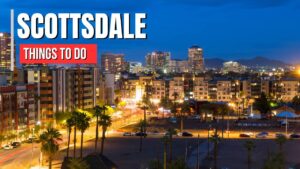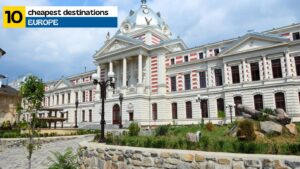Know essential safety tips and expert advice to help you decide if Albania is the right destination for your next adventure.
As a passionate traveler and seasoned travel writer, I know how important it is to research a destination thoroughly before making any plans. One of the most common questions I get from first-time visitors is, “Is Albania safe to travel?” Known for its stunning landscapes, rich cultural heritage, and warm, welcoming locals, Albania has become an increasingly popular spot for European backpackers and adventure-seekers. It’s no longer the hidden gem it once was, but how safe is it really?
Deep into everything you need to know about traveling safely in Albania. From understanding general safety and crime rates to tips on transportation, solo travel, and practical advice, this article will provide all the essential information you need to travel with confidence and fully embrace the beauty of this Balkan treasure. Let’s see why Albania is not only a must-visit destination but also one that’s surprisingly safe for all kinds of travelers.
Understanding Albania’s Safety Reputation
Since the 1990s, Albania has transformed dramatically. Once isolated under a communist regime, the country has opened up to the world. It is now a NATO member and a candidate for EU membership. Despite this progress, Albania still faces misconceptions about crime and safety, often due to outdated stereotypes and its past. Most visitors find Albania to be safe, welcoming, and far removed from these misconceptions.
Is Albania Safe to Travel for Tourists?
Yes, Albania is safe for tourists. Travelers report positive experiences, often highlighting the country’s charm, friendly locals, and peaceful atmosphere. Albania’s crime rate is relatively low compared to many Western countries, and violent crimes against tourists are rare.
While petty crimes like pickpocketing or bag snatching may occur in crowded areas or on public transportation, they are not widespread. Travelers can enjoy Albania’s beauty and culture without major concerns. Staying alert and using common sense ensures a smooth experience for any traveler.
Safety for Solo Travelers, Especially Women
Solo travelers, including solo female travelers, often report positive experiences in Albania. The locals are known for their friendliness and hospitality, making visitors feel welcome. Women traveling alone generally feel safe, and street harassment is less common than in many other destinations. Solo female travelers should still follow basic precautions.
Avoid walking alone in poorly lit areas late at night, and dress modestly in rural areas to respect local traditions. Staying in reputable accommodations and joining guided tours can further enhance safety and comfort.
How Safe is Public Transportation in Albania?
Albania’s public transportation system is functional and budget-friendly, though not always the most organized. Minibuses, known as furgons, serve as the primary mode of intercity transport. They are generally safe but can be unpredictable regarding schedules and routes. Taxis are also safe, especially when using official ones with meters. If a taxi doesn’t use a meter, it’s best to agree on the fare upfront.
Apps like Speed Taxi and UPs Taxi make booking rides in Tirana more convenient. Renting a car is an option, but driving in Albania can be challenging. Roads in rural areas may be poor, and local drivers can be aggressive. If renting a car, stay alert, follow speed limits, and avoid driving at night in unfamiliar areas.
Is Albania Safe at Night?
In cities like Tirana, Durrës, and Vlora, you can generally feel safe at night, especially in well-lit and busy areas. Many locals take evening strolls, enjoying the atmosphere in public spaces. This “xhiro” tradition, where people walk around after dark, makes the city feel vibrant and safe.
Travelers should still be cautious. While central areas are generally safe, it’s wise to avoid isolated spots, particularly late at night. In rural areas, the nights are quieter, but still safe. If you plan to return late to your accommodation, ensure your route is well-lit and secure.
Natural Hazards and Outdoor Safety
Albania’s natural beauty offers adventure for nature lovers, from hiking in the mountains to relaxing on the beaches. Travelers should stay cautious when enjoying outdoor activities. Always check the weather forecast before hiking or mountain climbing, especially in areas like the Accursed Mountains. Stick to marked trails and consider hiring local guides for remote treks.
Be mindful of strong currents when swimming in rivers or at unguarded beaches. While wild animals pose minimal threat, ticks in wooded areas can be a concern. Wear long clothing and use insect repellent to avoid tick bites.
Scams and Tourist Traps to Watch Out For
Scams are not widespread in Albania, but travelers should still watch out for a few common tricks. Some taxi drivers may attempt to overcharge tourists, so always confirm the fare before you begin your ride. In certain restaurants, especially in tourist-heavy areas, menus may lack prices, which can lead to unexpectedly high bills.
Be cautious of street vendors or unofficial tour operators who offer overpriced services. To avoid these pitfalls, always ask for a menu with prices, confirm taxi fares in advance, and book accommodations or tours through reputable services.
Healthcare and Emergency Services in Albania
Albania’s healthcare system has improved over the years. Major cities like Tirana, Durrës, and Shkodër offer reliable medical services, though rural areas may have limited access to healthcare. It’s recommended that travelers purchase travel insurance that covers medical emergencies, accidents, and potential evacuations.
Key emergency numbers to remember are: Police (129), Ambulance (127), and Fire Brigade (128). Emergency services may not always speak English, so having a translation app or a local guide can be helpful in urgent situations.
Real Traveler Reviews and Experiences
Seasoned travelers often describe Albania as one of Europe’s hidden gems. Visitors praise the country for its authenticity, warm hospitality, and stunning landscapes. Many travelers note how welcoming locals are, offering coffee or meals to strangers as a sign of friendship.
Social media platforms like Reddit and Facebook are filled with positive reviews from solo travelers, backpackers, and families, all praising Albania’s safety, affordability, and rich cultural experiences. Albania is considered an ideal destination for slow travel, offering a mix of history, adventure, and relaxation.
Essential Safety Tips for a Smooth Albanian Trip
Carry cash during your trip, as Albania remains a largely cash-based society. Many small towns and rural areas may not accept credit or debit cards, so it’s essential to have cash on hand. Purchasing a local SIM card will also give you access to affordable internet and ensure you can stay connected. Keep important emergency contacts, including your embassy and local emergency numbers, handy at all times.
While political protests are rare, it’s best to avoid them, as they can sometimes turn volatile. Respecting local customs, such as dressing modestly in rural areas and greeting people with a smile, will go a long way in ensuring a positive experience in Albania.
FAQs
1. Is Albania safe for tourists?
Yes, Albania is generally safe for tourists. Most travelers report positive experiences, with a low crime rate compared to many Western countries. While petty crimes like pickpocketing can occur in crowded areas, violent crime is rare.
2. Is Albania safe for solo female travelers?
Yes, Albania is considered safe for solo female travelers. Many solo women have explored the country and have shared positive feedback about their experiences. It’s always advisable to take basic safety precautions, such as avoiding poorly lit areas late at night and dressing modestly in rural areas.
3. How safe is public transportation in Albania?
Public transportation in Albania is generally safe. Minibuses (furgons) and official taxis are the primary means of getting around. Travelers should be cautious with unofficial taxis and always confirm the fare before starting a ride. Rental cars are also an option, but driving can be challenging due to road conditions and local driving habits.
4. Are there any health risks when traveling to Albania?
Healthcare facilities in major cities like Tirana are adequate, but rural areas may have limited medical resources. It’s recommended to have travel insurance that covers medical emergencies. Drinking tap water in major cities is usually safe, but it’s best to stick to bottled water in rural areas.
5. Is Albania safe to visit at night?
Albania is generally safe at night, especially in well-lit urban areas. Cities like Tirana and Durrës have active nightlife, and many locals enjoy evening strolls. It’s still wise to be cautious and avoid isolated areas late at night, particularly in rural regions.
6. Is there a risk of natural disasters in Albania?
Albania is located in a seismically active region, so there is a risk of earthquakes. Major earthquakes are rare. If you’re planning outdoor activities such as hiking, always check the weather forecast and follow safety guidelines, especially in remote or mountainous areas.
7. Are scams common in Albania?
While scams are not widespread, a few common ones include overcharging by taxi drivers, street vendors without prices, and unofficial tour operators offering overpriced services. Always confirm taxi fares, ask for menus with prices, and book tours through reputable agencies.
8. Is Albania safe for hiking and outdoor activities?
Albania is a fantastic destination for outdoor activities, including hiking and mountain climbing. Travelers should take safety precautions, such as sticking to marked trails and hiring local guides for more remote treks. Check the weather forecast before embarking on outdoor adventures, especially in areas like the Albanian Alps.
9. How is the local police presence in Albania?
The local police in Albania are present in major tourist areas and work to ensure the safety of visitors. Many cities have increased their police presence in popular spots like Tirana, Shkodër, and Saranda. If you need assistance, don’t hesitate to contact the police.
10. What should I do in case of an emergency in Albania?
In case of an emergency, dial 129 for police, 127 for ambulance services, and 128 for fire services. English may not always be spoken by emergency personnel, so it’s helpful to have a local guide or translation app on hand. Be sure to have the contact details for your embassy or consulate as well.






